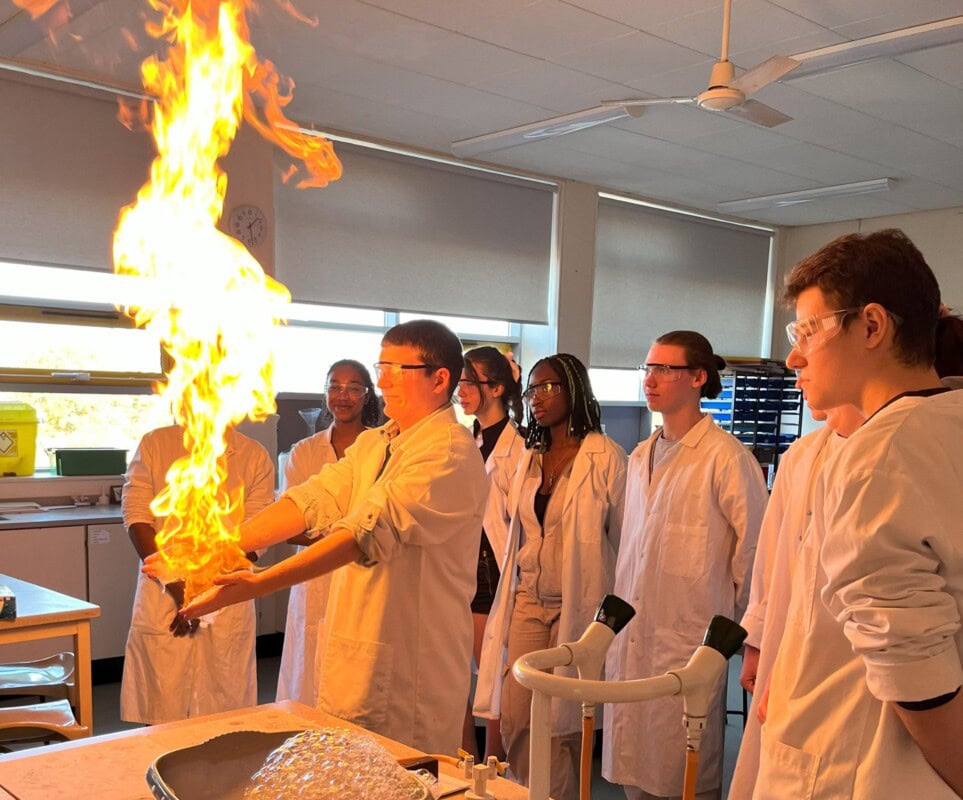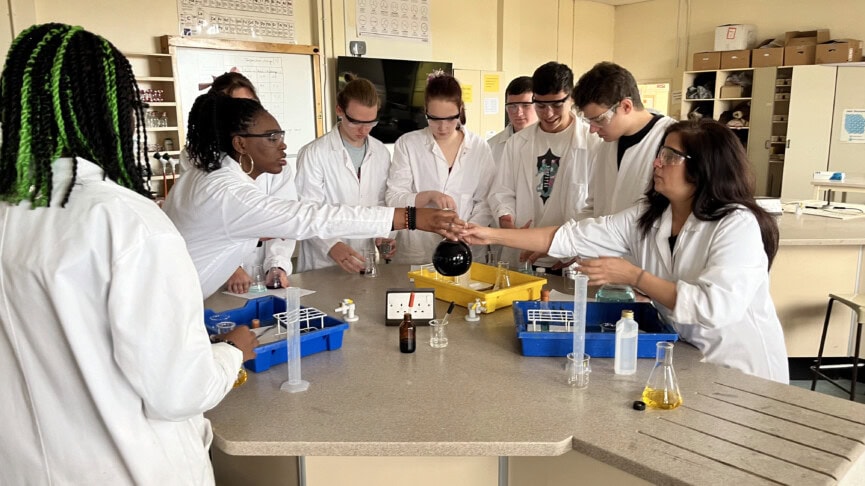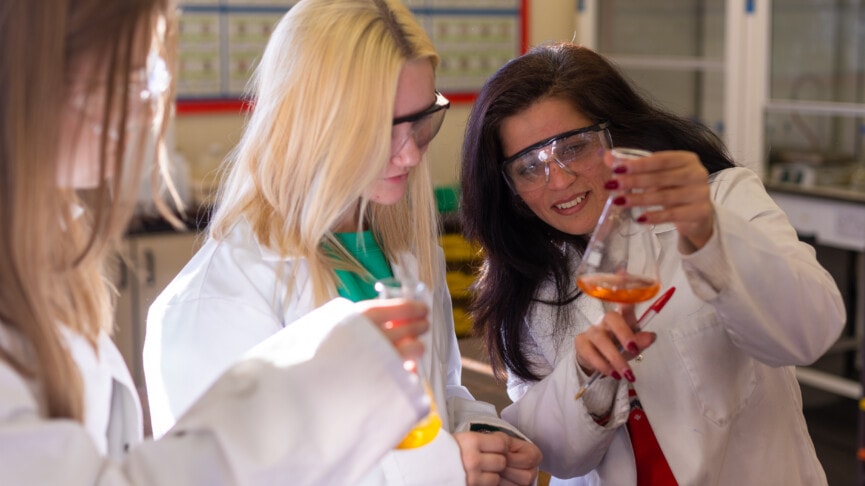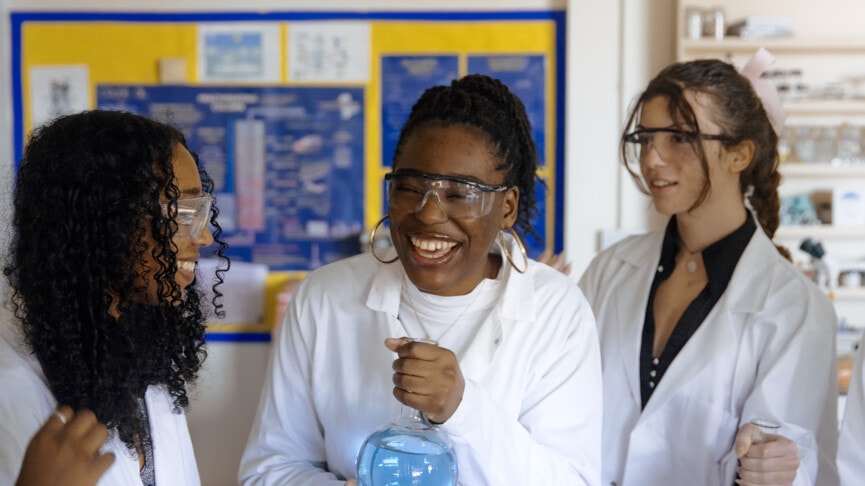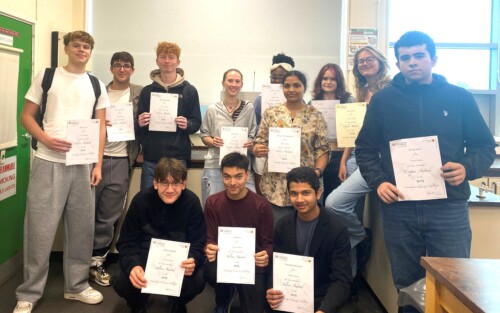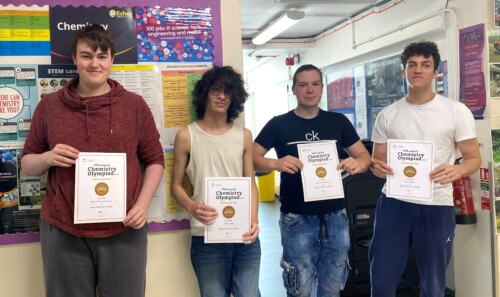Overview
Chemistry is the study of how the elements and their compounds behave. It overlaps with Physics and Biology as chemical principles underpin both the physical environment in which we live and all biological systems.
This course will help to develop your interest and enthusiasm for chemistry, including developing your interest in further study and related careers. It will help you appreciate how society makes decisions about scientific issues and how the sciences contribute to the success of the economy and society.
Chemistry has a great capacity to solve many of the global challenges that society faces in the 21st Century, including energy, food, climate change and health care. A new generation of chemists and other scientists will be involved in tackling these global challenges. If you want to enhance your understanding and be in a position to make a difference, then Chemistry is for you.
Entry Requirements
In addition to the College Entry Requirements, to qualify for this course you will also need to achieve a minimum of:
- Grade 6 in GCSE Chemistry, Physics and Biology (or 6-6 in GCSE Combined Science). Grade 6 in GCSE Maths (Higher Level).
Course Details
Initially in the first year, you will study chemical concepts and theories that bridge your knowledge between GCSE and A Level, before developing this knowledge and understanding further.
You will study the ideas that underpin the study of inorganic and physical chemistry including periodic trends, and consideration of energy and yield in improving sustainability. Through these topics you will also develop and improve your skills in planning, implementing, analysing, and evaluating data.
This course will help you to develop important quantitative techniques involved in measuring masses and using volumetric apparatus to measure volumes of gases and solutions.
During the year you will also be introduced to organic chemistry and its important applications within everyday life, including current environmental concerns associated with sustainability. You will be given opportunities to develop practical skills in organic chemistry, including use of Quick Fit apparatus for distillation, heating under reflux and purification of organic liquids. You will also learn to appreciate the need to consider the responsible use of organic chemicals in order to reduce demand for hydrocarbon fuels and avoid the use of ozone depleting chemicals.
The second year builds on your knowledge and understanding of topics studied in the first year. You will develop a strong appreciation of the skills, knowledge and understanding of scientific methods. You will also understand how society makes decisions about scientific issues and how the sciences contribute to the success of the economy and society. There is a particular focus on how amino acids are the building blocks of polypeptides and proteins, on the preparation of synthetic condensation polymers, on the importance of synthetic organic chemistry (for example; in the design and development of drugs in the pharmaceutical industry), and on the chemistry of fuel cells and renewable resources.
Assessment
Assessment is by three written examinations with multiple choice, structured and extended response questions, covering theory and practical skills.
Subject Combinations
We strongly advise you to take Mathematics and another science subject (Biology if you are considering medicine), as many science degree courses related to Chemistry require Mathematics and two sciences at the top universities.
University Destinations
Chemistry A Level is a highly respected qualification, with the majority of our students going onto university to take a medical-related degree.
Here are some typical university destinations that our Chemistry A Level students go on to.
Click on a destination to see some examples of courses they have taken;

The University of Manchester
Typical courses: Medicine / Maths / Childrens’ Nursing /Biomedical Sciences

University of Bristol
Typical courses: Mechanical Engineering / Economics and Politics / Mechanical Engineering

The University of Nottingham
Typical courses: Medicine / Philosophy and Psychology / Engineering and Physical Sciences with Foundation Year

University of Oxford
Typical courses: Biochemistry (Molecular and Cellular) / Medicine / Mathematics and Philosophy
Careers
This course is an excellent foundation (and indeed essential) for further study of Chemistry, Chemical Engineering, Medicine, Veterinary Science, Dentistry, and related subjects such as Pharmacy, Pharmacology and Biomedical Sciences. It is highly recommended for other sciences as well.
The course also provides a valuable education if you take chemistry no further but wish to pursue a career in, for example, Finance, Publishing or Patent Law.
FAQs
What skills will I need and develop on this course?
Numerical, problem solving, and communication skills are central to the course. Chemistry is a practical subject, and the development of practical skills is also fundamental. The course will give many opportunities to develop the skills needed to plan, collect, and analyse empirical data. You will also develop your research and critical skills – i.e; how to find relevant scientific information and how to interpret and evaluate scientific data.
What extra support/enrichment activities are on offer?
You will be encouraged to attend the lunchtime chemistry clinics or scheduled subject tutorials for assistance when required. We also offer mentoring sessions for 6.1 students. We encourage students to attend a Chemistry lecture day held at the University of London as well as other lectures that will enable you to extend your knowledge and interest in chemistry beyond the syllabus. We try to arrange for you to spend a day at a university to get hands-on experience with spectroscopic techniques that are not available here at the college.
The department also runs a trip to Fuller’s Brewery to learn about alcohols and our Chemistry In Action event is also very popular.
Competitions such as Chemistry Olympiad and Chemistry Cambridge Challenge enable students to challenge themselves in unseen contexts. We also organise school analyst competitions, which allows students to demonstrate and expand on their existing chemistry knowledge, skills and aptitude for analytical science through practical analytical experiments based on relevant societal or industrial problems.
You will also be alerted to relevant online lectures or activities on offer including ‘taster’ courses at various universities, especially those related to chemistry, medicine, veterinary science, and dentistry.
